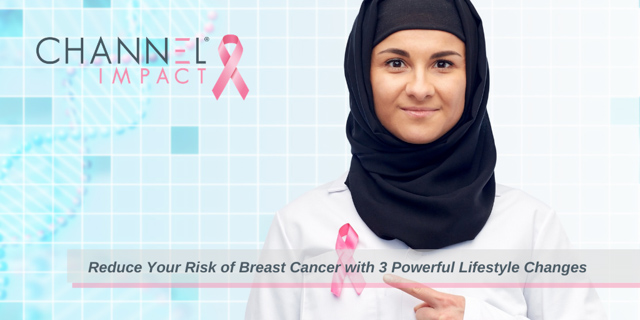Reduce Your Risk of Breast Cancer with 3 Powerful Lifestyle Changes

By Sandy Preto, Channels-as-a-Service Manager, Channel Impact
We are not defenseless against breast cancer. Yes, there are risk factors – from increasing age to family history to breast density – that are squarely out of our hands. But so many are in our control! There are habits we can embrace today to lower our risk.
That’s why Notes4Hope, the nonprofit I founded in the wake of my own breast cancer diagnosis, focuses on promoting healthy lifestyle habits that help prevent cancer and facilitate recovery. Today I’m sharing a few of the best ways to live your healthiest life, and lower your risk of breast cancer. (For a more comprehensive guide, check out BreastCancer.org’s “Think Pink, Live Green” booklet and checklist, which you can download for free.)
1. Get moving!
“Evidence is growing that regular physical activity reduces breast cancer risk, especially in women past menopause,” according to the American Cancer Society, which recommends at least 150-300 minutes of exercise every week. While COVID-19 may have postponed your gym visits or Zumba classes for a while, it’s still possible to find something that’s effective, enjoyable, and empowering. Discover a free yoga video series on YouTube, dust off your old elliptical machine, or grab a friend for a socially distanced hike!
When combined with a well-balanced diet, regular physical activity can also help you maintain a healthy weight – another important way to lower your risk.
2. Be thoughtful about what you put in, and on, your body.
The positive effects of a balanced and varied diet full of fresh, whole foods are well-documented, and there is ongoing research about the effect of diet on breast cancer risk. Since my diagnosis and recovery, I’ve begun to focus more on choosing foods and personal care products without pesticides and toxic chemicals. Some favorite resources: The Environmental Working Group’s Shopper’s Guide to Pesticides in Produce™ helps me prioritize the produce that’s most important to buy organic. They identify (and annually update) “The Dirty Dozen” and “The Clean Fifteen,” rankings of fruits and vegetables with the highest and lowest levels of pesticide contamination. And when it comes to beauty and personal care products – like that hand sanitizer you may have stocked up on in the last several months – I like using the Think Dirty app to scan and identify products with non-toxic ingredients right in the store aisle.
3. Carefully consider the medical therapies, tests, and treatments that you undertake.
The Mayo Clinic notes that “combination hormone therapy for more than three to five years increases the risk of breast cancer.” The organization also suggests that “some research suggests a link between breast cancer and cumulative exposure to radiation over your lifetime,” so it’s wise to speak openly with your doctor when considering hormone therapies and medical tests involving high levels of radiation.
Equip yourself with knowledge about the risks and benefits, as well as other possible treatments, so that you can make an informed choice about the approach that’s right for you.
P.S. There’s still time to join Notes4Hope at one of our Oktoberbrest events! Check our website or my previous blog posts for details. And don’t forget – you can help provide comfort to a breast cancer patient with the purchase or donation of a Notes4Hope Breast Cancer Wellness and Recovery (WAR) kit!
Channel Impact is generously hosting us in this space for a multi-part blog series on breast cancer prevention. Check back weekly throughout October to learn some surprising facts about breast cancer, the importance of screenings even during a pandemic, steps you can take to empower and advocate for yourself, and tools and resources to guide you on a journey of vigilance and prevention.
Do It Today!
Find farmers’ markets and community supported agriculture (CSA) options in your area, or research how you can start a small garden at home – fresh, nutritious food can even be grown on an apartment balcony!
Stay in the Know
Keep tabs on what’s happening in the channel and the impact it will have on the partner community by subscribing to Channel Impact communications.
Recent News
Search Buzz
Buzz Categories




